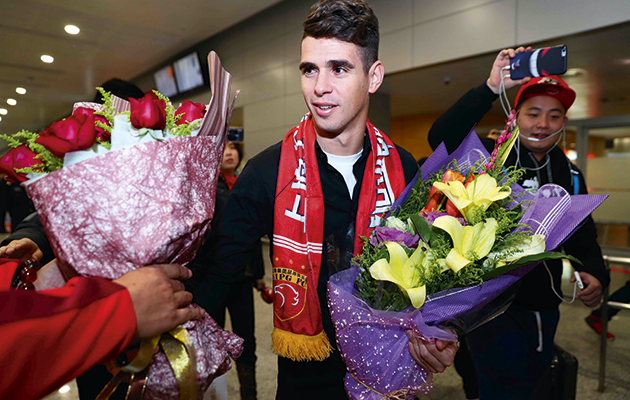By now, Chinese fans know that in the weeks leading up to the opening of a transfer window – especially the winter one ahead of a new season – two things are certain. The first is that big names will sign for Chinese Super League clubs; the second is that many more will be linked with moves. These “unnamed Chinese clubs” feature regularly in English websites, bringing not only clicks but also the gratitude of agents all over Europe.
In January, Chelsea’s Oscar was signed by Shanghai SIPG for a fee reported to be around £60million, with the midfielder joining Brazilian compatriot Hulk at the club now coached by Andre Villas-Boas. Soon after, Carlos Tevez was snapped up by city rivals Shanghai Shenhua to become – again, reportedly – the highest-paid player in the world, on £615,000 a week.
These figures, however, should be taken with a pinch of Sichuan peppercorn.
Chinese teams rarely discuss such matters – and that leaves a vacuum for selling clubs and agents, in whose interests it is to exaggerate the figures. Even so, the sums involved are quite considerable. And after six years and counting of spending that has grown in size and intensity every season, there has been a reaction both at home and overseas.
The vast sums have finally prompted action from the country’s authorities. The Chinese FA (CFA) have announced that clubs will only be allowed to field three non-Chinese players when the new season kicks off in March. They will also be required to name two under-23 Chinese players in their matchday squads, with at least one of those in the starting line-up.
Then, in a dramatic move to restrict spending, the CFA announced that clubs must be financially independent of their parent companies. And, from now on, a club that runs at a deficit for three years in a row will be expelled from the CSL.
In a statement, the CFA explained: “The CFA will hire a third-party audit company to audit professional clubs, to closely inspect club’s funding sources, expenses, youth investment, salary payment methods, and publish the revenue and expenditure report to the public, and remove from the register clubs with serious insolvency issues.”
The CFA move followed an earlier statement from the State General Administration of Sports – the country’s highest sports authority – who issued a yellow card to clubs that were spending excessively.
The spree, said a spokesperson, had resulted in “the grave phenomenon of clubs burning money, salaries that are too high for foreign players, not attaching importance to youth training, and only emphasising short-term achievements and neglecting long-term development”.
Pressure had been building behind the scenes for some time, ever since clubs started splashing serious cash in 2014. In December, the People’s Daily – which doesn’t publish anything the government does not agree with – ran an editorial calling for a cooling period.

Chelsea boss Antonio Conte has warned about the financial might of the Chinese Super League clubs.
In Europe, and especially England, the financial strength of this new power from the east has led to Chelsea manager Antonio Conte stating: “The Chinese market is a danger for all. Not only for Chelsea, but all the teams in the world.”
That comment was well-reported in China and, although a little over the top, plenty of people in Asia and Europe noted the irony of a coach of a club that became a member of the global elite on the back of massive investment by a Russian owner, Roman Abramovich, early in the last decade.
Former Croatia midfielder Mario Stanic, who spent the last few years of his career with Chelsea, expressed similar concerns about when the Londoners, or Conte’s previous club Juventus, were outbidding everyone else.
“So, if Juventus is taking players from smaller clubs, it is OK and everyone should be honoured and proud, but when Chinese clubs throw money on the table it is wrong?” asked Stanic. “I am glad that Chinese clubs have shown up. Europe’s biggest clubs are a little scared now.”
With professional football in the country barely two decades old, there are no illusions in China that there
is still a long way to go. But while there is no doubt that recent spending by clubs has made the Chinese Super League stronger, more exciting and more glamorous, some have been left wondering whether shelling out hundreds of millions of pounds on importing coaches such as Luiz Felipe Scolari and players like Oscar, Hulk and Tevez has actually been worth it.
Whether the recent CFA action will curb spending remains to be seen as the new rules and financial regulations will take some time to implement. In the meantime, the big names keep arriving.
By John Duerden







